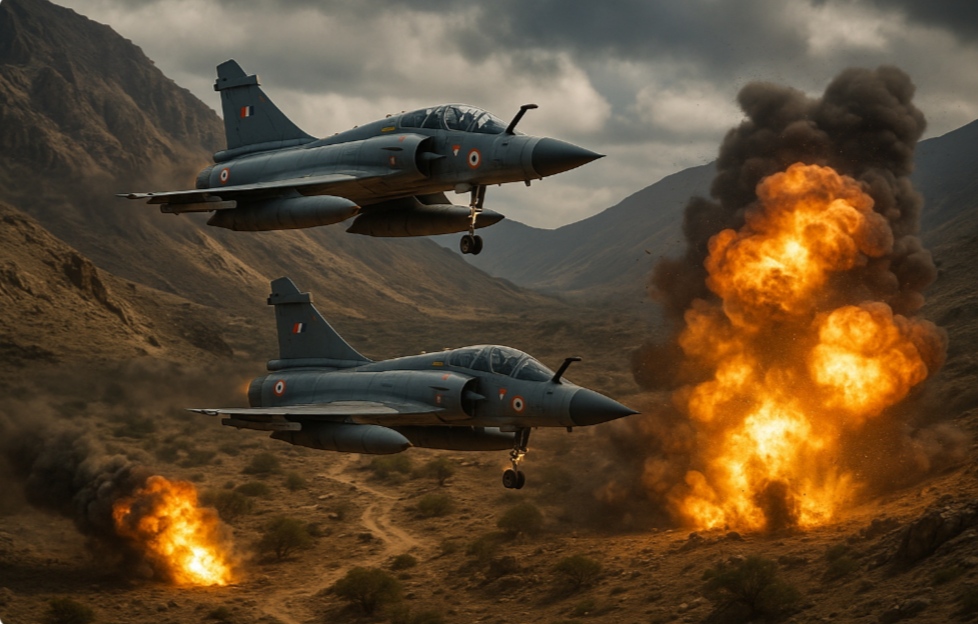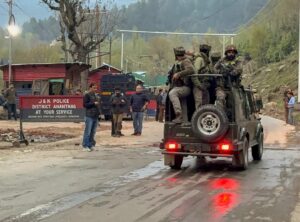India carried out airstrikes on Pakistan, targeting terrorist hideouts
Amid rising tensions between India and Pakistan, the Indian Air Force carried out a major operation and carried out airstrikes on terrorist camps in Pakistan Occupied Kashmir (PoK) in the early hours of Tuesday. This operation was carried out around 3:30 am, in which fighter jets like Mirage 2000 and Sukhoi-30MKI took part. According to defense sources, at least three bases of Jaish-e-Mohammed and Lashkar-e-Taiba have been completely destroyed in this operation.
Background of the airstrike Last week, seven Indian Army soldiers were martyred in a major terrorist attack in Pulwama district of Jammu and Kashmir. Jaish-e-Mohammed had claimed responsibility for this attack. Since then, there was an atmosphere of anger across the country and pressure was mounting on the central government to take retaliatory action. Prime Minister Narendra Modi had called a high-level security meeting after the incident, in which National Security Advisor Ajit Doval, Defense Minister and the chiefs of the three armies participated.
Details of the operation According to Indian Air Force sources, the airstrike was named ‘Operation Shakti 2.0’. More than 12 fighter jets took part in this mission and penetrated about 80 kilometers inside Pakistan’s border and targeted the target.
The IAF used ‘Spice 2000’ and ‘Laser Guided Bombs’ for the bombing. According to preliminary data, more than 40 terrorists are feared to have been killed in this attack, although official confirmation is yet to be made.
Pakistan’s reaction The Pakistan government has strongly condemned India’s action and called it an “act of aggression”. Pakistan’s Foreign Ministry claimed that the Indian jets returned within minutes and there was “no significant damage”. However, videos and photos of locals that surfaced on social media point to a different story.
Pakistan Army spokesman Major General Ahmed Sharif claimed that their fighter jets chased away the Indian planes and the Indian Air Force had to return in a hurry. He also said that Pakistan reserves the right to respond.
India’s official statement Indian Foreign Ministry spokesperson Arindam Bagchi said in a press conference, “It was a non-offensive and targeted action aimed at eliminating terrorist bases. India is firm on its policy against terrorism and will take all necessary steps to protect its citizens in the future as well.
“Defense Minister Rajnath Singh also wrote in a tweet, “This action of the Indian Air Force is a response to the martyrdom of our brave soldiers. There will be no compromise on the security and integrity of the country.”
Opposition and public reaction Opposition parties have also supported this action. Congress President Mallikarjun Kharge said, “Any conspiracy of terror against the country cannot be tolerated. This step of the government was courageous and necessary.
“Hashtags like #IndiaStrikesBack and #SurgicalStrike2 are trending on social media. From common citizens to celebrities, everyone has praised the bravery of the Air Force.
International response Countries like the US, France and Australia have supported India’s right to self-defense. China and Turkey have appealed to both countries to exercise restraint.
United Nations Secretary-General Antonio Guterres has appealed to both countries to find a solution through dialogue. He said that “increasing tensions in South Asia can be a threat to global peace.”
Further strategy The Indian government has issued a high alert at all sensitive places in the country. Internet services have been temporarily shut down in Jammu and Kashmir. Army deployment and border surveillance have been increased. The Home Ministry has said that “the security of the country is paramount and we are ready to deal with any situation.”
Conclusion: This airstrike is a clear message in Indian policy that terrorist activities will no longer be tolerated and every attack will be given a befitting reply. This incident can have a deep impact on India-Pakistan relations in the coming days.







Post Comment